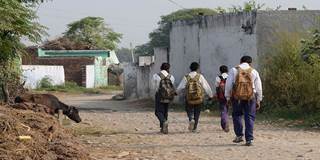The international community agrees that every person has the right to a quality education. And while there is no consensus about how to uphold that right, two imperatives seem obvious, and one solution satisfies both.
ISLAMABAD – The need to uphold the right to education has gotten a lot of attention in recent years. Ensuring “inclusive and equitable quality education” for all is one of the 17 Sustainable Development Goals agreed upon by world leaders in 2015. But achieving this goal by the SDGs’ 2030 target date will require us to make smart use of limited resources.
The scale of the challenge is enormous. In Pakistan, for example, an estimated 22.8 million children are out of school, of which 78% are aged 10-16. A staggering 44% of Pakistani children who complete their primary education drop out, rather than moving on to secondary school.
The problem is not that children do not want to study. Instead, as UNICEF and UNESCO point out, the problem is largely one of supply-side barriers, from a lack of accessible schools (whether because they are too full or too far) to the incompatibility of livelihoods (such as harvesting schedules) and school timetables.

ISLAMABAD – The need to uphold the right to education has gotten a lot of attention in recent years. Ensuring “inclusive and equitable quality education” for all is one of the 17 Sustainable Development Goals agreed upon by world leaders in 2015. But achieving this goal by the SDGs’ 2030 target date will require us to make smart use of limited resources.
The scale of the challenge is enormous. In Pakistan, for example, an estimated 22.8 million children are out of school, of which 78% are aged 10-16. A staggering 44% of Pakistani children who complete their primary education drop out, rather than moving on to secondary school.
The problem is not that children do not want to study. Instead, as UNICEF and UNESCO point out, the problem is largely one of supply-side barriers, from a lack of accessible schools (whether because they are too full or too far) to the incompatibility of livelihoods (such as harvesting schedules) and school timetables.